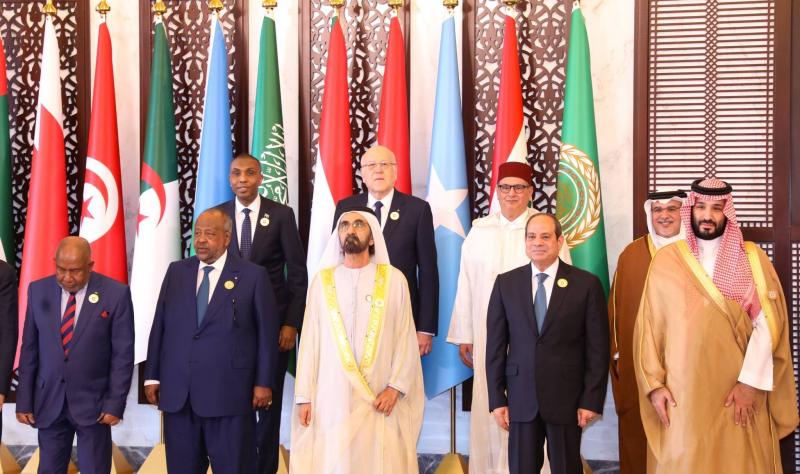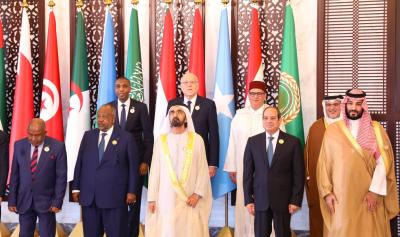The 33rd Arab Summit has commenced in the Bahraini capital, Manama, with broad participation from Arab leaders and heads of state. The opening speech was delivered by Saudi Crown Prince Mohammed bin Salman, who reiterated Riyadh's support for the establishment of a Palestinian state and international recognition of it, calling for an immediate ceasefire in Gaza and urging the international community to stop the brutal aggression against the Palestinian brethren. He also called for the cessation of any activity that affects the safety of maritime navigation in the Red Sea.
Bahraini King Hamad bin Isa Al Khalifa emphasized that the interest of the Palestinian people relies on their unity and affirmed the Palestine Liberation Organization as the legitimate representative of the Palestinians. He called for an international peace conference in the Middle East, expressing support for the full recognition of the State of Palestine and its membership in the United Nations.
The Secretary-General of the Arab League, Ahmed Aboul Gheit, stated that "the Israeli aggression on Gaza highlights the urgency of ending the occupation immediately," stressing the need for a reliable and irreversible path toward establishing the Palestinian state and calling for an international peace conference embodying the two-state solution vision. Aboul Gheit addressed issues concerning the Arab world, particularly Sudan.
UN Secretary-General Antonio Guterres remarked that the situation in Gaza represents the largest conflict causing civilian harm in decades, adding that the war in Gaza is horrifying and rejecting the policy of collective punishment against the Palestinians. He called for a ceasefire in Gaza, stating that the attack on Rafah is unacceptable and the level of aid is exceedingly low.
The President of the African Union Commission condemned the unprecedented destruction in Gaza, calling for an end to the war and the implementation of a two-state solution. He warned that every delay in establishing this solution means the continuation of disaster. He expressed commitment to reinforcing African-Arab partnership ties.
The Secretary-General of the Organization of Islamic Cooperation stated that “Palestine is subjected to a brutal war that must be stopped immediately,” emphasizing the need to ensure the Palestinians remain on their land and rejecting their displacement.
Jordanian King Abdullah II highlighted that the destruction witnessed in Gaza will have negative repercussions for future generations, stressing the need to support the Palestinian government in fulfilling its responsibilities. He warned against the continuation of the war in Gaza and asserted that Palestinians must obtain their state with East Jerusalem as its capital.
Egyptian President Abdel Fattah el-Sisi praised Saudi Arabia's efforts in successfully holding the previous Arab summit. He commented that the Israeli war on Gaza presents a choice between peace and chaos, emphasizing that Israel is intensifying killings and seeking to displace an entire people. He announced serious engagement in attempts to save the region from collapse, criticizing Israel for evading its responsibilities while continuing military operations in Rafah, and asserting that Cairo rejects the liquidation of the Palestinian cause through the displacement of Palestinians.
Palestinian President Mahmoud Abbas stated that war crimes and genocide in Gaza have continued for seven months under American cover, noting that the U.S. has used the veto four times to prevent a ceasefire and to block Palestine's UN membership. He announced the formation of a government of competencies, which has received international support without any backing. Abbas launched a fierce attack on Hamas, accusing it of refusing to end the division, which he claims works in Israel's favor.
Iraqi President Abdul Latif Rashid reaffirmed Iraq's stance in supporting the Palestinian people's steadfastness in facing challenges and achieving their rights, reiterating his country's commitment to the unity of Syrian territory and cleansing it from terrorism.
Lebanese caretaker Prime Minister Najib Mikati mentioned that "Lebanon arrives at the Bahrain summit riding a wave of crises," but remains hopeful about Arab unity. He addressed concerns about ongoing events and escalation on Lebanon's southern borders alongside the suffering in Gaza, attributing it to continued Israeli incursions. He stressed Lebanon's calls for a ceasefire and stability, warning that continued Israeli actions would escalate the crisis throughout the region and repeating his calls for Israel to withdraw from occupied territories.
Mikati highlighted concerns over the rise in Syrian refugees in Lebanon, urging Arab solidarity in addressing this crisis. He emphasized the need for timely and effective return mechanisms for displaced Syrians, denouncing the exploitation of this issue which threatens Lebanon's security.
Mikati concluded by acknowledging that the Palestinian issue remains the first Arab concern and that its catastrophe continues to affect Arab security and stability, asserting the need for immediate and sustained ceasefire with humanitarian assistance to rebuild Gaza and promote a serious and effective political track aimed towards a just and comprehensive solution based on the two-state solution framework.
Mauritanian President Mohamed Ould Cheikh El Ghazouani stressed the importance of rejecting division factors, emphasizing dialogue and solidarity among Arab states. He expressed sorrow over Gaza's suffering and lamented the limited capacity for impactful intervention.
Libyan Presidential Council Chairman Mohamed Younes al-Menfi condemned the Israeli aggression against the people of Gaza and Palestine while reaffirming Libya's commitment to join South Africa's lawsuit against Israel at the International Court of Justice.
Yemeni Presidential Council President Rashad Muhammad al-Alimi noted regional and international efforts toward a comprehensive solution for the Yemeni case but reiterated steadfast support for the Palestinian people.
Moroccan Prime Minister Aziz Akhannouch remarked that economic integration among Arab states has yet to reach the desired level, rejecting the imposition of new realities in Gaza, which would only exacerbate the situation and violence. He reiterated his support for the legitimate rights of the Palestinian people to establish an independent state.




